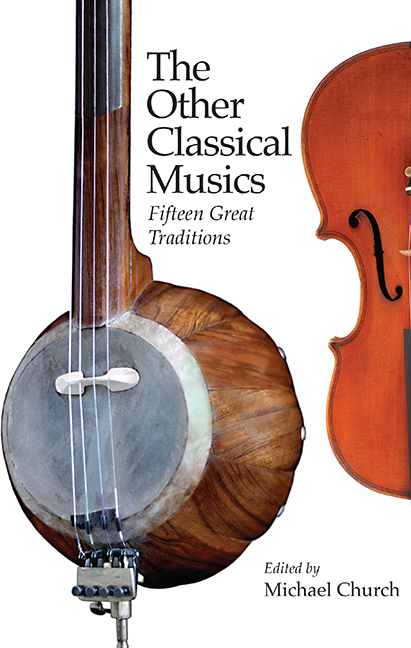Book contents
- Frontmatter
- Dedication
- Contents
- List of Illustrations
- List of Contributors
- Preface and Acknowledgements
- Introduction
- Maps
- 1 Thailand, Laos, Cambodia, Vietnam
- 2 Java
- 3 Japan
- 4 China: The Guqin Zither
- 5 Chinese Opera
- 6 North India
- 7 South India
- 8 Mande Jaliyaa
- 9 North American Jazz
- 10 Europe
- 11 North Africa and the Eastern Mediterranean: Andalusian Music
- 12 The Eastern Arab World
- 13 Turkey
- 14 Iran
- 15 Uzbekistan and Tajikistan
- Notes
- Bibliographies
- Index
6 - North India
Published online by Cambridge University Press: 29 May 2021
- Frontmatter
- Dedication
- Contents
- List of Illustrations
- List of Contributors
- Preface and Acknowledgements
- Introduction
- Maps
- 1 Thailand, Laos, Cambodia, Vietnam
- 2 Java
- 3 Japan
- 4 China: The Guqin Zither
- 5 Chinese Opera
- 6 North India
- 7 South India
- 8 Mande Jaliyaa
- 9 North American Jazz
- 10 Europe
- 11 North Africa and the Eastern Mediterranean: Andalusian Music
- 12 The Eastern Arab World
- 13 Turkey
- 14 Iran
- 15 Uzbekistan and Tajikistan
- Notes
- Bibliographies
- Index
Summary
The man in the silk shirt raises his outstretched hand towards the younger of the two sitarists seated before the small audience, and says ‘Wah!’ The musician pauses momentarily to acknowledge the compliment by touching his forehead, before repeating the admired phrase. This time it's extended with a new twist, and continues seemingly unstoppable, rising, falling and unexpectedly rising again to reach new heights before eventually subsiding towards the tonic note. Foreseeing this conclusion, the audience bursts out with a chorus of ‘Wah! Wah! Shabash! [very good] Kya bat! [wonderful]’ which almost drowns the final notes.
The tabla accompanist, waiting his turn to play during the free-tempo introduction, shakes his head in approval. The elder sitarist says nothing, but his eyes gleam with pleasure at his son's improvisation, which his own fingers soundlessly follow on own fret-board. Now he throws the young man a new challenge: a phrase that, instead of starting low, rising to a peak, and falling to its starting point, does the opposite. In reply, his son repeats his father's rising conclusion, but brings it to a low ending.
The audience is again delighted. The man in the silk shirt, without whose presence in the front row no house concert in this part of town is considered complete, turns to his neighbour and mutters: ‘Such mastery! And he is so young!’
‘INDIAN classical music’ is a familiar concept. While it is necessary to distinguish the music of North India and its neighbours – principally Pakistan, Nepal and Bangladesh – from that of South India, both have become seen as parallel traditions of ‘Indian classical music’. This is a result partly of international tours by Indian concert musicians, and partly of the settlement of diasporic South Asian communities in many areas of the West. This chapter concerns North Indian, or Hindustani, music.
In India, ‘classical’ music is sharply distinguished from other types of music including folk music and popular music (such as the music of Bollywood movies), though it overlaps with dance, certain forms of which are also called ‘classical’, and with some types of religious singing, which are not. Our opening vignette illustrates several aspects of what is considered ‘classical’ about Hindustani music. It is music played (or sung) for the delectation of an attentive audience, typically drawn from an educated, wealthy, urban social elite.
- Type
- Chapter
- Information
- The Other Classical MusicsFifteen Great Traditions, pp. 138 - 159Publisher: Boydell & BrewerPrint publication year: 2015
- 1
- Cited by



